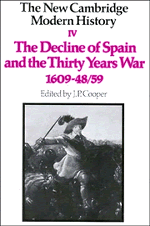Book contents
- Frontmatter
- INTRODUCTORY
- THE CENTRAL CONFLICTS
- THE UNMAKING AND REMAKING OF STATES
- Chapter XV The Spanish peninsula 1598–1648
- Chapter XVI French institutions and society 1610–61
- Chapter XVII The Habsburg lands 1618–57
- Chapter XVIII The fall of the Stuart monarchy
- CHAPTER XIX THE ENDING OF POLISH EXPANSION AND THE SURVIVAL OF RUSSIA
- THE FRONTIERS OF EUROPE
- References
Chapter XVIII - The fall of the Stuart monarchy
from THE UNMAKING AND REMAKING OF STATES
Published online by Cambridge University Press: 28 March 2008
- Frontmatter
- INTRODUCTORY
- THE CENTRAL CONFLICTS
- THE UNMAKING AND REMAKING OF STATES
- Chapter XV The Spanish peninsula 1598–1648
- Chapter XVI French institutions and society 1610–61
- Chapter XVII The Habsburg lands 1618–57
- Chapter XVIII The fall of the Stuart monarchy
- CHAPTER XIX THE ENDING OF POLISH EXPANSION AND THE SURVIVAL OF RUSSIA
- THE FRONTIERS OF EUROPE
- References
Summary
The development of political life and government in England since 1300 had been considerably affected by foreign war and to a lesser extent by domestic conflicts. English kings had been both attackers and defenders, defending their French inheritance and their northern border, asserting claims over Wales, Ireland, Scotland and France. From Edward I's conquest of Wales to Henry V's of France, attack and conquest had predominated. These claims were never clearly renounced by any of the Tudors and were asserted at enormous cost by Henry VIII. Part of that cost was the strength of movements of protest and rebellion 1525-54 which were broader in geographical and social characteristics than the disorders before Henry VII. The cost of trying to match effectively the scale of continental warfare in Charles V's time had profoundly affected English governments by 1559. Thereafter they were more than ever limited to a basically defensive policy, however much their subjects hankered after memories of past glories. From 1570 to 1639 England had its longest period of domestic peace since 1066 and, unlike the nearly comparable period 1330-80, was only engaged in foreign wars for just over a third of the time. One of the most important symptoms of political crisis under the Stuarts was their inability to pursue an effective foreign policy. This impotence saved England from direct participation in the Thirty Years War and at the same time helped to produce the Civil War.
Nevertheless the scale of the Elizabethan war effort had important consequences. The debts Elizabeth left were comparatively small, because she had kept to the tradition set by Henry VIII of selling crown land rather than meeting the full cost of war by taxation. The more serious effects were on government and governed. War was accompanied by profiteering and corruption, which was scarcely novel, though it has been argued that corruption and self-seeking in high places grew greater.
- Type
- Chapter
- Information
- The New Cambridge Modern History , pp. 531 - 584Publisher: Cambridge University PressPrint publication year: 1970

